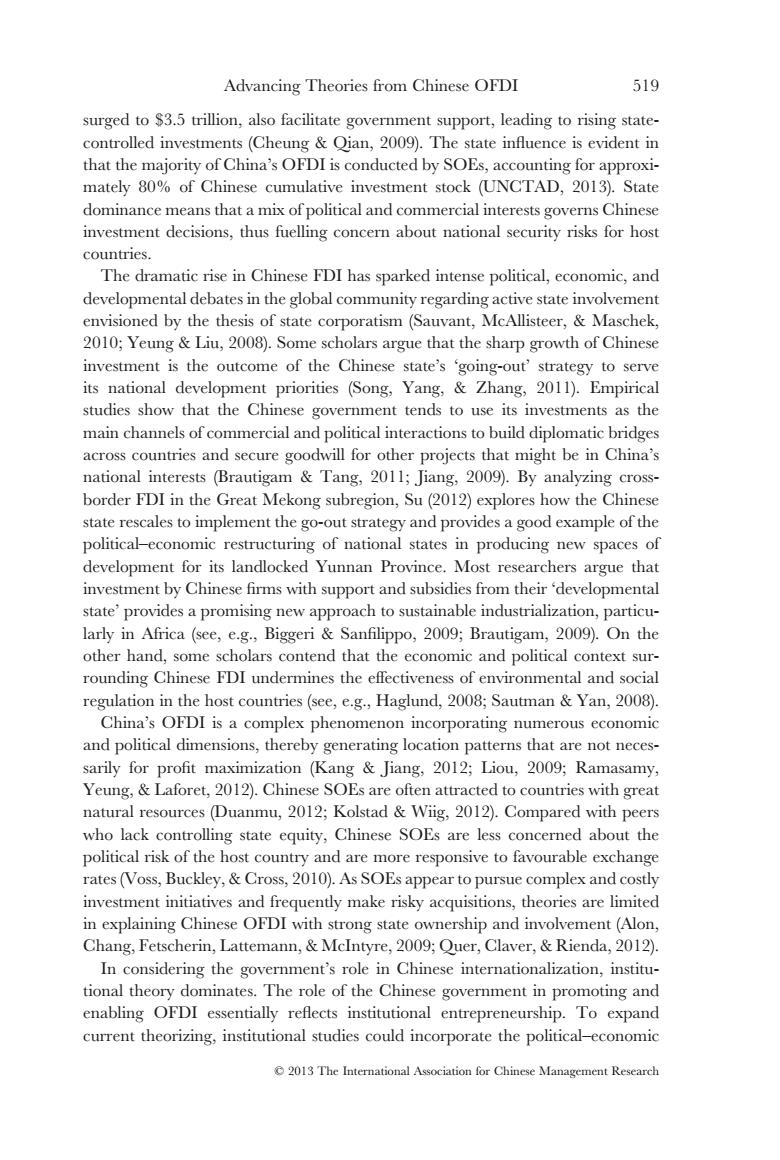正在加载图片...

Advancing Theories from Chinese OFDI 519 surged to $3.5 trillion,also facilitate government support,leading to rising state- controlled investments(Cheung Qian,2009).The state influence is evident in that the majority of China's OFDI is conducted by SOEs,accou ng for approxi- mately 80%of Chinese cumulative investment stock (UNCTAD.2013).State dominance means that a mix of political and commercial interests governs Chinese investment decisions,thus fuelling concern about national security risks for host countries. The dramatic rise in Chinese FDI has sparked intense political,economic,and developmental debates in the global community regarding active state involvement by the thesis of state corp ratism (Sauvant,McAllisteer,&Maschek, 2010:Yeung&Liu,2008).Some scholars argue that the sharp growth of Chinese investment is the outcome of the Chinese state's 'going-out'strategy to serve its national development priorities (Song,Yang,Zhang,2011).Empirical studies show that the Chin nt tend to use its tments as the main channels of commercial and political interactions to build diplomatic bridges across countries and secure goodwill for other projects that might be in China's national interests (Brautigam Tang,2011;Jiang,2009).By analyzing cross- border FDI in the Great Mekong subregion,Su (2012)explores how the Chines state rescales to implement the go-out strategy and provides a good example of the political-economic restructuring of national states in producing new spaces of development for its landlocked Yunnan Province.Most researchers argue that investment by Chinese firms with support and subsidies from theirdevelopmental state'provides a promising new approach to sustainable industrialization,particu- larly in Africa(see,e.g.,Biggeri Sanfilippo,2009;Brautigam,2009).On the other hand,som scholars ntend that the economic and political context sur- rounding Chinese FDI undermines the effectiveness of environmental and social regulation in the host countries(see,e.g.,Haglund,2008;Sautman Yan,2008). China's OFDI is a complex phenomenon incorporating numerous economic and political dimensions,thereby generating location patt erns that are not neces sarily for profit maximization (Kang Jiang,2012;Liou,2009;Ramasamy, Yeung,Laforet,2012).Chinese SOEs are often attracted to countries with great natural resources (Duanmu,2012;Kolstad Wiig,2012).Compared with peers who lack controlling state equity,Chinese SOEs are less concerned about the political risk of the host country and are more responsive to favourable exchange rates(Voss,Buckley,Cross,2010).As SOEs appear to pursue complex and costly in explaining Chinese OFDI with strong state ownership and involvement(Al Chang,Fetscherin,Lattemann,McIntyre,2009;Quer,Claver,Rienda,2012). In considering the government's role in Chinese internationalization,institu- tional theory dominates.The role of the Chinese government in promoting and enabling OFDI essentially reflects institutional entrepreneurship.To expand current theorizing,institutional studies could incorporate the political-economic 2013 The International Association for Chinese Management Research surged to $3.5 trillion, also facilitate government support, leading to rising statecontrolled investments (Cheung & Qian, 2009). The state influence is evident in that the majority of China’s OFDI is conducted by SOEs, accounting for approximately 80% of Chinese cumulative investment stock (UNCTAD, 2013). State dominance means that a mix of political and commercial interests governs Chinese investment decisions, thus fuelling concern about national security risks for host countries. The dramatic rise in Chinese FDI has sparked intense political, economic, and developmental debates in the global community regarding active state involvement envisioned by the thesis of state corporatism (Sauvant, McAllisteer, & Maschek, 2010; Yeung & Liu, 2008). Some scholars argue that the sharp growth of Chinese investment is the outcome of the Chinese state’s ‘going-out’ strategy to serve its national development priorities (Song, Yang, & Zhang, 2011). Empirical studies show that the Chinese government tends to use its investments as the main channels of commercial and political interactions to build diplomatic bridges across countries and secure goodwill for other projects that might be in China’s national interests (Brautigam & Tang, 2011; Jiang, 2009). By analyzing crossborder FDI in the Great Mekong subregion, Su (2012) explores how the Chinese state rescales to implement the go-out strategy and provides a good example of the political–economic restructuring of national states in producing new spaces of development for its landlocked Yunnan Province. Most researchers argue that investment by Chinese firms with support and subsidies from their ‘developmental state’ provides a promising new approach to sustainable industrialization, particularly in Africa (see, e.g., Biggeri & Sanfilippo, 2009; Brautigam, 2009). On the other hand, some scholars contend that the economic and political context surrounding Chinese FDI undermines the effectiveness of environmental and social regulation in the host countries (see, e.g., Haglund, 2008; Sautman & Yan, 2008). China’s OFDI is a complex phenomenon incorporating numerous economic and political dimensions, thereby generating location patterns that are not necessarily for profit maximization (Kang & Jiang, 2012; Liou, 2009; Ramasamy, Yeung, & Laforet, 2012). Chinese SOEs are often attracted to countries with great natural resources (Duanmu, 2012; Kolstad & Wiig, 2012). Compared with peers who lack controlling state equity, Chinese SOEs are less concerned about the political risk of the host country and are more responsive to favourable exchange rates (Voss, Buckley, & Cross, 2010). As SOEs appear to pursue complex and costly investment initiatives and frequently make risky acquisitions, theories are limited in explaining Chinese OFDI with strong state ownership and involvement (Alon, Chang, Fetscherin, Lattemann, & McIntyre, 2009; Quer, Claver, & Rienda, 2012). In considering the government’s role in Chinese internationalization, institutional theory dominates. The role of the Chinese government in promoting and enabling OFDI essentially reflects institutional entrepreneurship. To expand current theorizing, institutional studies could incorporate the political–economic Advancing Theories from Chinese OFDI 519 © 2013 The International Association for Chinese Management Research